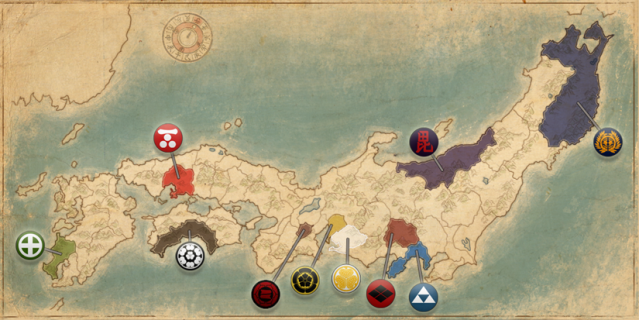Total War: Shogun 2
| Total War Series |
|---|
|
Total War: Three Kingdoms - Portal Total War Saga: Thrones of Britannia Medieval II: Total War - Portal |
Total War: Shogun 2 is the next Total War title that is scheduled to be released by Sega and the Creative Assembly exclusively for PC via Steam on March 15, 2011. As in the original Shogun: Total War, the game will take place in feudal Japan during the Sengoku Jidai, or Warring States era, when various clans competed for control of Japan. The game is currently in a Pre-Alpha stage, and as such there is not much definite information about the game. However, it is already known that pre-battle speeches will return, as will naval battles, ninja and geisha units, and the game will feature a smaller amount of units than recent total war games (About 30-40). On Thursday, June 3, 2010, Shogun 2: Total War was announced, and the following day, Totalwar.com was redone and a new page for Total War: Shogun 2 was added.
Overview
It is the middle of the 16th century in Medieval Japan. The country, once ruled by a unified government, is now split into many warring clans. The player takes on the role of one Daimyo – the clan leader – and will use military engagements, economics and diplomacy to achieve the ultimate goal: re-unite Japan under his supreme command and become the new Shogun – the undisputed ruler of Japan.
Choose from 9 different clans and compete on and offline for the undisputed supremacy of Medieval Japan. Gain experience to level up your own character-warlord as well as your generals and agents.
Play through the Main Campaign in single player or invite a friend online to play competitively or cooperatively in Campaign Multiplayer mode. Join 8-player multiplayer battles with your own upgradable avatar and climb the online Leaderboard to show the world who reigns supreme. Also including exciting new modes of team play for clans, a first in the Total War series.
A streamlined User Interface makes management of your kingdom much easier. Build and govern cities, recruit and train troops, conduct diplomacy and manage your agents – each feature is now introduced with comprehensive tutorials, gradually revealing the depth of the Shogun 2 campaign map – the heart and soul of the Total War experience.
Features
Battle Mechanics and AI
Just like in Empire: Total War and its follow-up Napoleon: Total War, Total War: Shogun 2 will feature full-scale naval engagements. This time around, however, the battlemaps will supposedly include land islands for player orientation, though this cannot be confirmed due to the pre-alpha state of Shogun 2. What the naval units of the Japanese clans remains to be seen; they will most likely consist of Chinese junks, Red Seal ships, and early japanese ironclads.
Also, the siege mechanics of Shogun 2: Total War have supposedly improved greatly. Instead of simply surrounding the enemy and waiting for a hole to appear in the defences, attackers will fight through new, multi-level forts and castles. The Creative Assembly has announced that there will be castles with 5 levels of construction, just like in Medieval 2: Total War. Siege battles will also be fought in 5 stages.
The Creative Assembly has claimed to have redone Total War: Shogun 2's artificial intelligence. The game's AI, like the original total Shogun: Total War, is supposedly programmed according to Sun Tzu's The Art of War. This is fitting, as the game mechanics demand an AI capable of both ranged and melee warfare. Battle AI in sieges is also supposedly have improved, though this cannot be confirmed because of the pre-alpha state of Shogun 2.
Confirmed to be returning to Shogun 2 are Pre-battle speeches. There will be over 100,000 possible speeches based on the character, their location, and their relationship to the enemy, etc.[1]
The Hero System
A new Hero System has been announced, whereupon each faction shall have a Hero that can sway the tide of battle, and are supposedly almost unstoppable. IGN reports that 'hero units are a nearly unstoppable force on the battlefield, capable of holding bridge crossings against entire armies, or smashing through a battle line to engage the enemy general'. Some may think that this seems overpowered; however The Creative Assembly has reported that they are simply 'Highly ranked elite units' and 'available at the top of the tech tree'. Creative Assembly employees have also posted in the official total war forums that they will not be able to take on an entire army. This new system is receiving mixed reactions and mixed reports from IGN and The Creative Assembly.
Multiplayer
Multiplayer in Shogun 2: Total War will be implemented through Valve's Steam service. There are rumours that the new multiplayer will have a lobby, and it has already been confirmed that there will be 8-player online campaigns akin to Napoleon: Total War and for the first time, new modes of team play for clans. Multiplayer will also feature an online leaderboard to show player rankings and presumably an honor system not unlike that of the original Shogun: Total War. Like every game run through Steam, players will be able to access the Steam online community while ingame.
There will be a number of pre-order bonuses in Shogun 2 which will affect the multiplayer. Pre-ordering from online retailers will give you one upgrade from the start in multiplayer as well as special armor for the player's avatar.
Campaign
The singleplayer campaign mode in Shogun 2 will have 9 playable Japanese clans, each headed by an RPG-like character-warlord. Players will be able to gain experience to level up these warlords as well as their own generals and agents. A new agent system will feature rock-paper-scissors mechanics, and players will be able to build special buildings which will boost their soldiers' morale in a siege battle. However, these buildings can be destroyed or captured, which will lower morale.
As in the original Shogun, there will be 4 seasons as opposed to the 2 half-year system of Rome, Medieval 1 and 2, and Empire, and the Month/Week system of Napoleon. A streamlined user interface in campaign will supposedly help management of the player(s)'s faction and each new feature of campaign will be introduced with extensive tutorials. [2]
Music
Jeff Van Dyke will be returning to compose the music for Total War: Shogun 2. He was the original composer of the music for Rome: Total War, Medieval 2: Total War, Medieval: Total War, and Shogun: Total War. Many senior total war fans have embraced this news as the best hope for Shogun 2: Total War, as Jeff Van Dyke has received many awards for his music scores, including BAFTA awards for the music of Rome: Total War and the original Shogun: Total War. However, some people want to keep the composer of the Napoleon: Total War score for this new title.
Score recording sessions involving Australian taiko group, TaikOz, have occurred in Sydney, Australia as of October 2010.
Pre-Order Bonuses
There are a number of pre-order bonuses available for Total War: Shogun 2. People who pre-order at Gamestop will be able to play the historical Battle of Kowagoe, which was a siege battle fought between the Hojo and Uesugi factions in 1545. Pre-ordering at BestBuy will give you an additional 1,000 Koku, whch is Shogun 2's in-game currency. Pre-ordering from other online retailers will give you the Limited Edition instead of the Standard one for the same price. The Limited Edition will only be available for pre-ordering, and wont't be available in stores after the game's release on March 15th. An extra upgrade point available for your general as well as the Battle of Nagashino scenario. The Hattori faction will be playable and there will be special armor for a player's avatar. Note that all these bonuses are available only with the pre-ordered Limited Edition of Total War: Shogun 2.

The Clans
There is 9 Clans plus one more clan if you buy the Limited Edition Box

The Chosokabe Clan

The Chosokabe clan claim descent from the Chinese Emperor Qin Shi Huang. Despite their long history, the Chosokabe clan has had mixed fortunes, and has been under the protection of the Ichijo, who helped them to recapture their castle at Oko. Chosokabe Kunichika, the daimyo, is certainly bold and brave enough to have imperial blood in his veins: he once jumped off an Ichijo castle wall for a dare! He has now broken with the Ichijo, rebuilt Chosokabe influence, and vowed revenge on his enemies. Kunichika can take advantage of the Chosokabe’s traditional strengths: they are phenomenal farmers, and gain extra income from their lands; they produce superb archers and cheap archer units too. With their strength concentrated in Tosa province, the Chosokabe are already at war with the Kono clan of Iyo to the northwest. Now they have to make an interesting strategic decision: deal with their immediate enemies in Iyo, crush the Ichijo clan at home in Tosa, or attack the Miyoshi clan of Awa province. This last might seem like madness, but Awa is blessed with plentiful warhorses, a valuable resource for anyone planning to expand their clan army. The other nearby resource that will be incredibly useful is the good building stone in Sanuki to the north east. Once these immediate opportunities and problems are resolved, then who is to say the next shogun will not be a Chosokabe lord?
Clan Traits
- Increased income from farms
- Reduced recruitment cost and upkeep for all bow infantry
- Can recruit superior bow infantry
The Date Clan

Date warriors have fierce and unforgiving natures. Their foes learn this on the battlefield, shortly before they die. All Date units have a charge bonus, and their fearsome no-dachi samurai, with two-handed swords, are cheap to recruit and maintain. The Date can also recruit superior no-dachi units as well: attack is a Date watchword! Seen from their home province of Iwate, there are many rivals worth attacking. Date Harumune, their daimyo, is already at war with rebels at his own door, not to mention the Mogami clan of Ugo and Usen to the west. An attack there could put holy shrines under Date control. To the southwest, matters are a little more settled: the Hatakeyama clan in Miyagi is currently at peace with the Date, but who knows if such a situation will last? The forests of Miyagi represent a useful resource too. The clan was founded by Isa Tomomune when he was given control of the Date district by the shogun Minamoto Yoritomo at the end of the 12th Century. The clan steadily gained influence until recently, when fighting broke out within the clan over the issue of a marriage alliance with the Uesugi. Date Harumune quarrelled violently with his own father, Tanemune, over plans to marry off his younger brother: a large number of the Date retainers and warriors agreed with Harumune and the old man was removed. Now, Harumune needs a new challenge, perhaps the shogunate?
Clan Traits
- Charge bonus to all units
- Reduced recruitment cost and upkeep for no-dachi samurai
- Can recruit superior no-dachi samurai
The Hattori Clan

The Hattori are the leading family in Iga, a mountainous province, and the home of the independent Iga Sokoku Ikki, a kind of proto-republic which denied the power of the Kamakura shogunate’s feudal lords. The people of Iga developed a school of martial arts, the Iga-ryu ninjutsu, which combined martial arts, assassination techniques and unconventional warfare tactics. They used their ninjutsu to keep their independence, and then to make themselves wealthy as swords-for-hire. The tradition of independence, however, has remained strong in Iga and among the Hattori. Ninjutsu remains a dark art, passed down through families and jealously guarded from outsiders’ eyes. It is not surprising, then, that the Hattori can recruit ninja warriors more cheaply than any other clan, and their ninja also have more expertise, both on and off the battlefield. Under the leadership of Hattori Yasunaga, the clan remains dangerous. As he looks beyond the borders of Iga, who knows where ambition may take his clan: perhaps to the shogun’s palace? The Hattori are largely at peace with their neighbours, although such arrangements have a tendency to fall apart. To the north, the Asai in Omi represent a tempting target, as there is a school of ninja there. To the south, the Kitabatake and Tsutsui defend holy sites that might be better under Hattori stewardship, while the Ashikaga of Yamato represent all that is wrong with the old tired system of government, as they control what passes for a shogunate at the moment.
Clan Traits
- +2% to the success chance of ninja actions
- Specialist Hattori units can hide effectively in battle
- Specialist Hattori units possess kisho training
The Hojo Clan

The Hojo are greater builders than any other clan. Any castle costs are reduced for them, and damage is cheaper to repair. They can also produce cheaper, and better, siege weapons than any other clan. These skills allow the Hojo to pursue a strategy of occupying land, then daring an enemy to evict them. The Hojo began their rise to power modestly enough on the Kanto plain, taking advantage of civil war and the troubles of others to establish themselves. Ise Shinkuro, a powerful official in the shogunate, founded the clan, but it was his son who adopted the name Hojo, even though the family have no connection with the Hojo clan of elder days. The clan did not go unchallenged, and they fought both Uesugi factions: the Uesugi even stopped fighting each other to take on the Hojo! They have also had incidents with the Imagawa and Takeda clans, but for now there is an uneasy peace. Should the Hojo daimyo ever be in a position to become shogun, peace will vanish faster than the cherry blossoms. From their homelands in Izu and Sagami, the Hojo are surrounded by threats and great opportunities. They are, for the moment, at peace with Imagawa, and the Takeda in Kai to the northwest. The Takeda, in addition to being superb horsemen, also occupy a province with superior warhorses, and no warlord can afford to ignore such a potential prize. Suruga is also a prize worth contemplating. However, the Hojo also have an immediate problem: they are under threat from an Ogigayatsu clan army about to invade Sagami from Musashi.
Clan Traits
- Castles are cheaper to build and repair
- Reduced recruitment costs and upkeep for siege units
- Can recruit superior siege units
The Mori Clan

The Mori have a long history of seafaring and are sea masters without equal. They can read the waves and move their fleets further than other clans, and their shipbuilding skills make the construction and maintenance of ships cheaper too. They can also build some rather superior vessels as well. The Mori came to prominence as jito, or stewards, of the Aki province after the Jokyu War in 1221. Despite owing their position to the Kamakura shogunate, they distanced themselves from their sponsors, and were in league with Ashikaga Takauji when he overthrew the old order. They got caught up in the struggles between the Amako and Ouchi clans, and only survived by combining military might with astute diplomacy. Under Mori Motonari, their daimyo, the clan is still at war with the Amako and, indeed, their home in Aki is threatened by an invasion from the north by the Amako. They are still allied with the Ouchi clan of Suo and Nagati to the west, and have peaceful relations with the Kikkawa and Kono in Bingo and Iyo respectively. The war with the Amako is not without opportunity, though: the Amako’s home province of Iwami has deposits of precious metals. Access to other valuable resources would require the removal of the Kikkawa and Kono. But with the sea-going skills of the Mori and the wealth of Iwami, an ambitious daimyo could go far, perhaps as far as the shogun’s palace?
Clan Traits
- Increased campaign map movement range for all ships
- Reduced recruitment costs and upkeep for all ships
- Can recruit superior ships
The Oda Clan

From his castle in Owari, Oda Nobuhide commands a clan with a formidable reputation. The Oda are rightly respected for their skills as inspiring battlefield commanders of ashigaru. These common soldiers are cheaper to train and maintain than samurai, if not quite as deadly. Numbers, however, are becoming important in warfare, and ashigaru can be recruited in very large numbers. The Oda not only produce ashigaru efficiently and economically, they can also recruit superior ashigaru forces as well. Originally retainers of the Shiba clan, the Oda grew as the Shiba faded, but this only led to decades of strife within the family for supremacy. Eventually, the Kiyosu branch of the family came to prominence and eventually changed the clan name to Oda, a respectful acknowledgement of their ancestor, Taira no Chikazane, who had settled in Oda in Echizen. Now, the Oda confront outsiders: to the north, the Saito of Mino province; to the east, the Tokugawa clan in Mikawa and, beyond them, the Imagawa lurk. An attack to the east could destroy the clan’s enemies, and will also give the Oda access to valuable warhorses in Mikawa province. No warlord should ever ignore the chance to improve the quality of his cavalry, particularly at the expense of his enemies! Relations with the Tsutsui clan in Ise to the west have been peaceful recently, but Ise is a tempting prize because of its inspirational religious sites. And beyond the immediate lies the prize of the shogunate&hellip.
Clan Traits
- Improved morale for all ashigaru
- Reduced recruitment costs and upkeep for all ashigaru
The Shimazu Clan

The Shimazu are a proud clan, with a long history worthy of their pride. To the Shimazu, loyalty is everything, and their generals are less likely to develop ambitions of their own. Shimazu katana samurai are cheaper to recruit and maintain in the field than those of other clans; they can also recruit superior katana-armed samurai. The clan can trace its ancestry back to Minamoto Yoritomo, the founder and first shogun of the Kamakura shogunate. In 1187, Yoritomo appointed his son, Tadahisa, as military governor of southern Kyushu. The young man took the name of Shimazu in Hyuga province, his seat of government, as his own. Thanks to a well-organised army and administration, abundant local resources, and a certain distance between Kyushu and the Kamakura court, the Shimazu clan became rich and powerful. They did not, however, become hidebound: when their vassals in Tanegashima met a strange, shipwrecked people from the other side of the world, the Shimazu were quick to see that trade with these “nanban” Europeans might be worthwhile. Now, under the daimyo Shimazu Takahisa, the clan has a chance for true greatness. Their home province of Satsuma is secure, and they are at peace with the Sagara of Higo province to the north. Higo, however, is a tempting target for expansion because of the warhorses to be found there. There is the small matter of a war with the Ito clan in the provinces of Osumi and Hyuga, but once these local difficulties are resolved the distance from Kyushu to the shogun’s palace is not so great after all&hellip.
Clan Traits
- Increased loyalty for all generals
- Reduced recruitment costs and upkeep for katana samurai
- Can recruit superior katana heroes
- Can recruit superior katana samurai
The Takeda Clan

Takeda warlords have ruled Kai, their home province, since the 12th Century, but they have known little peace. Clan infighting, a long series of struggles against repeated invasions from the neighbouring Shinano province, and wars against the Hojo and Imagawa clans, saw to that. They have, however, mastered diplomacy as well as horses, and have achieved peace on occasions. Now, under their daimyo, Takeda Shingen, the clan have opportunities and threats on all sides. A Murakami army is about to invade Kai from northern Shinano; the Kiso clan from beyond the mountains in Shinano, is at peace with the Takeda. Shinano itself, if its current owners are destroyed, has valuable stone resources for the taking. To the east, in Musashi, the Ogigayatsu clan are also peaceful, as are the Hojo of Sagami and Izu provinces. Sagami must be considered a tempting target for an ambitious warlord, thanks to the skilled smiths who live there. To the south the Imagawa clan have recently been reliable allies. The Takeda clan, then, have enemies, worthwhile prizes to aim for, and worthy allies. Not all clans are so blessed! As might be expected of horse-masters, the Takeda clan can recruit and train cavalry much more efficiently than other clans. They can also produce a superior class of horsemen to anyone else. And it may be those horsemen who carry the Takeda daimyo to the shogunate!
Clan Traits
- Improved morale for cavalry
- Reduced recruitment costs and upkeep for all cavalry
- Can recruit superior cavalry
The Tokugawa Clan

Although the Tokugawa are an ancient family, claiming descent from Minamoto no Yoritomo, the first shogun of the Kamakura shogunate, they have known hard times since those glorious days. They have also changed their clan name, with the permission of the Emperor Matsudaira, to Tokugawa, the place where Yorimoto’s descendent settled. The Tokugawa have been squeezed between two powerful and ambitious clans: the Imagawa to the east, and the Oda in the west, a most uncomfortable position. By accepting the protection of the Imagawa, the Tokugawa only guaranteed that they were frequently attacked by the Oda. This goes some way to explaining their superior diplomatic skills, their training and use of very good kisho ninja, and the superior metsuke who keep order in their lands. Now, they are at war with the Oda once again. An Oda army has actually invaded the Tokugawa province of Mikawa. In theory, the Tokugawa are vassals of the Imagawa clan to the east in the provinces of Suruga and Totomi. They do not, however, need to worry about the Kiso in Shinano province, as relations with these neighbours are peaceful. That said Shinano has useful stone resources that could prove useful to an ambitious warlord. Historically, after much struggle, Tokugawa Ieyasu did become the seii taishogun, the “great general who subdues the barbarians” and the ruler of Japan with the emperor as a figurehead. The Tokugawa clan kept control of Japan for over 200 years, shutting the country off from pernicious outside influences. History need not turn out that way: another Tokugawa could quite easily become shogun.
Clan Traits
- +2% to the success chance of metsuke actions
- Bonus to diplomatic relations
- Reduced recruitment costs and upkeep for kisho ninja
- Can recruit superior kisho ninja
The Uesugi Clan

The Uesugi are proud of their Buddhist faith. They can recruit and maintain warrior monks far more cheaply than any other clan. They can also recruit much better fighting monks and more effective monk agents than any other clan. Despite this religious solidarity, the history of the Uesugi is not tranquil. The current Uesugi leaders were originally the Nagao clan of Echigo, and were vassals to the Yamanouchi faction of the Uesugi clan. The Nagao fought alongside their masters against the Ogigayatsu, another part of the Uesugi clan, in a bitter dispute. The Yamanouchi, weakened by a war with the Hojo, were forced to seek help from the Nagao lord, Kagetora. His “help” included adopting the name of Uesugi, and taking control of the whole Uesugi clan! Just to make matters even more complicated, Uesugi Kagetora (as he now called himself) changed his name again to Uesugi Kenshin. He was an adherent of Bishamonten, the war god and took Buddhist vows. He then stepped down in favour of his brother, who proved to be staggeringly divisive and unpopular. Kenshin returned to power and now contemplates the future. There is much struggle yet to come if the clan is to be secure and an Uesugi is ever to be shogun! There are Uesugi rebels in Echigo itself, and to the south there is unfinished business in the shape of the Yamanouchi clan of Kozuke province. Luckily, there are peaceful relations with the Ashina clan of Fukushima, and the Mogami clan of Uzen province, but both of these areas have resources, wood and stone respectively, which could be of considerable use. In keeping with the religious bent of the Uesugi, Kozuke province has a tradition of philosophical scholarship that could be harnessed to the Kenshin’s purposes. A navy might also prove useful, as Sado, off the coast of Echigo, has plentiful gold deposits.
Clan Traits
- 2% to the success chance of monk actions
- Increased trade income
- Reduced recruitment costs and upkeep for warrior monks
- Can recruit superior warrior monks
External Links
For further information please visit the following links:
- The Shogun II: Total War forum
- IGN's First Look report on S2TW
- Shogun 2: Total War Official Site
- Shogun 2: Total War Forum at the .org
- Dojo II at the .org
References
[3] Totalwar Returns to Samurai Warfare
[4] Shogun 2 begins Grand Strategy Loop
